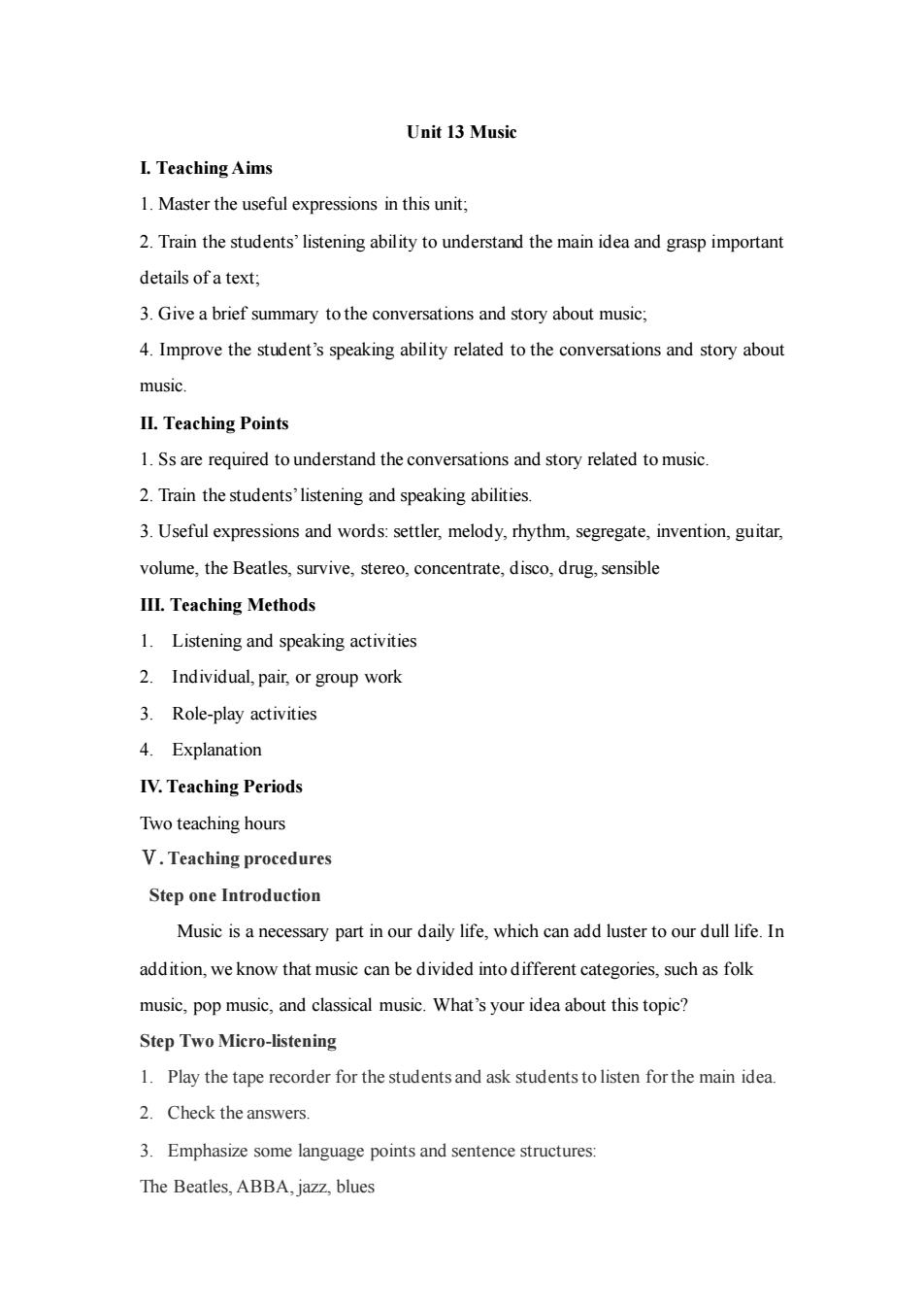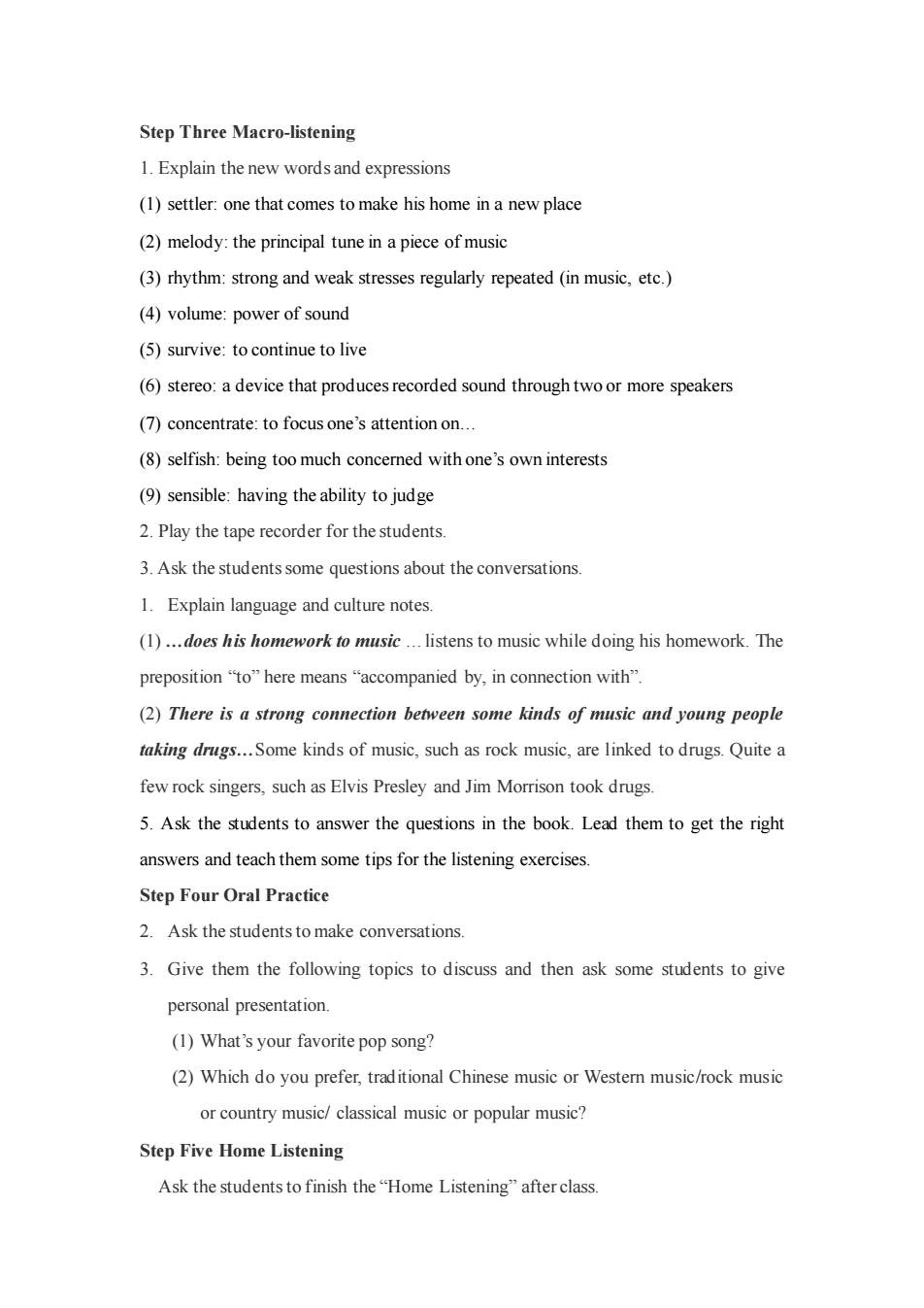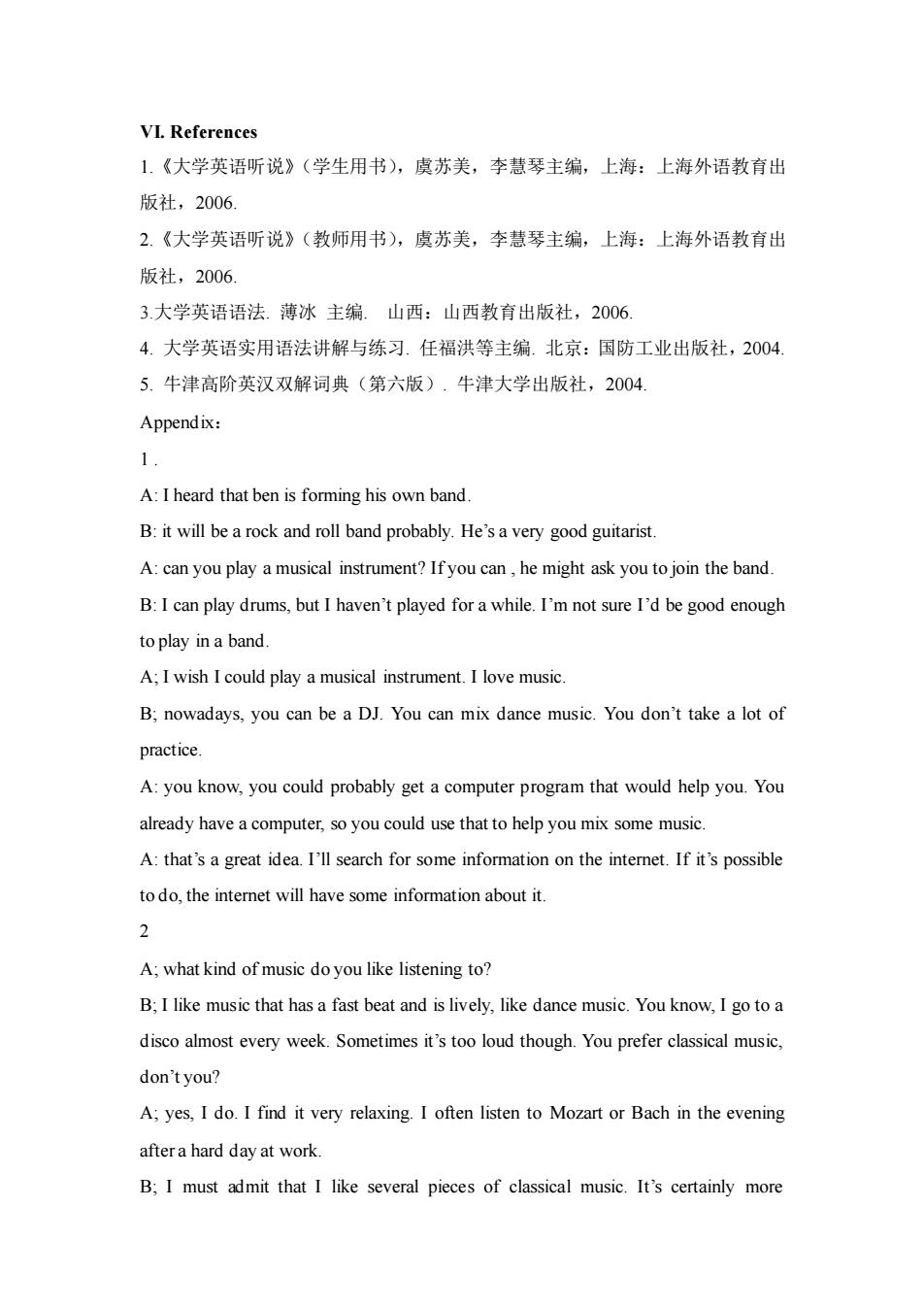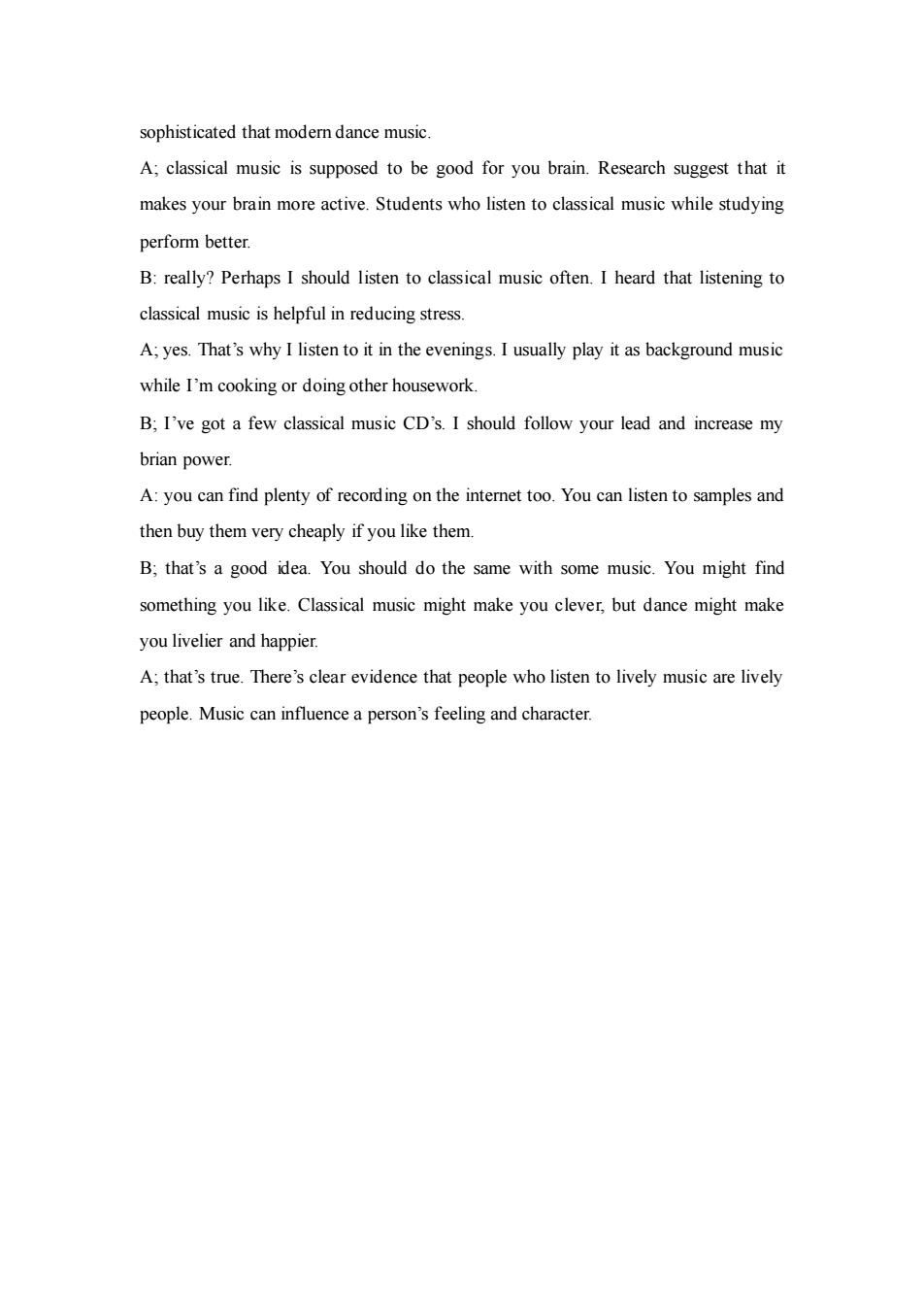
Unit 13 Music LTeaching Aims 1.Master the useful expressions in this unit 2.Train the students'listening ability to understand the main idea and grasp important details ofa text: 3.Give a brief summary to the conversations and story about music; 4.Improve the student's speaking ability related to the conversations and story abou music II.Teaching Points 1.Ss are required to understand the conversations and story related to music. 2.Train the students'listening and speaking abilities. 3.Useful expressions and words:settler,melody,rhythm,segregate,invention,guitar, volume,the Beatles,survive,stereo,concentrate,disco,drug,sensible III.Teaching Methods 1.Listening and speaking activities 2.Individual,pair,or group work 3.Role-play activities 4.Explanation IV.Teaching Periods Two teaching hours V.Teaching procedures Step one Introduction Music is a necessary part in our daily life,which can add luster to our dull life.In addition,we know that music can be divided into different categories.such as folk music,pop music,and classical music.What's your idea about this topic? Step Two Micro-listening 1.Play the tape recorder for the studentsand ask studentsto listen for the main idea. 2.Check the answers 3.Emphasize some language points and sentence structures The Beatles,ABBA,jazz,blues
Unit 13 Music I. Teaching Aims 1. Master the useful expressions in this unit; 2. Train the students’ listening ability to understand the main idea and grasp important details of a text; 3. Give a brief summary to the conversations and story about music; 4. Improve the student’s speaking ability related to the conversations and story about music. II. Teaching Points 1. Ss are required to understand the conversations and story related to music. 2. Train the students’ listening and speaking abilities. 3. Useful expressions and words: settler, melody, rhythm, segregate, invention, guitar, volume, the Beatles, survive, stereo, concentrate, disco, drug, sensible III. Teaching Methods 1. Listening and speaking activities 2. Individual, pair, or group work 3. Role-play activities 4. Explanation IV. Teaching Periods Two teaching hours Ⅴ. Teaching procedures Step one Introduction Music is a necessary part in our daily life, which can add luster to our dull life. In addition, we know that music can be divided into different categories, such as folk music, pop music, and classical music. What’s your idea about this topic? Step Two Micro-listening 1. Play the tape recorder for the students and ask students to listen for the main idea. 2. Check the answers. 3. Emphasize some language points and sentence structures: The Beatles, ABBA, jazz, blues

Step Three Macro-listening 1.Explain the new words and expressions (1)settler:one that comes to make his home in a new place (2)melody:the principal tune in a piece of music (3)rhythm:strong and weak stresses regularly repeated (in music,etc.) (4)volume:power of sound (5)survive:to continue to live (6)stereo:a device that produces recorded sound through two or more speakers (7)concentrate:to focus one's attention on. (8)selfish:being too much concemed with one's own interests (9)sensible:having theability to judge 2.Play the tape recorder for the students. 3.Ask the studentssome questions about the conversations. 1.Explain language and culture notes (1)...does his homework to music...listens to music while doing his homework.The preposition"to"here means"accompanied by,in connection with" 2)There is a strong connection beteen some kinds of music and young people taking drugs..Some kinds of music,such as rock music,are linked to drugs.Quite a few rock singers,such as Elvis Presley and Jim Morrison took drugs. 5.Ask the students to answer the questions in the book.Lead them to get the right answers and teach them some tips for the listening exercises Step Four Oral Practice 2.Ask the students to make conversations. 3.Give them the following topics to discuss and then ask some students to give personal presentation. (1)What's your favorite pop song? (2)Which do you prefer,traditional Chinese music or Western music/rock music or country music/classical music or popular music? Step Five Home Listening Ask the students to finish the"Home Listening"after class
Step Three Macro-listening 1. Explain the new words and expressions (1) settler: one that comes to make his home in a new place (2) melody: the principal tune in a piece of music (3) rhythm: strong and weak stresses regularly repeated (in music, etc.) (4) volume: power of sound (5) survive: to continue to live (6) stereo: a device that produces recorded sound through two or more speakers (7) concentrate: to focus one’s attention on… (8) selfish: being too much concerned with one’s own interests (9) sensible: having the ability to judge 2. Play the tape recorder for the students. 3. Ask the students some questions about the conversations. 1. Explain language and culture notes. (1) …does his homework to music …listens to music while doing his homework. The preposition “to” here means “accompanied by, in connection with”. (2) There is a strong connection between some kinds of music and young people taking drugs…Some kinds of music, such as rock music, are linked to drugs. Quite a few rock singers, such as Elvis Presley and Jim Morrison took drugs. 5. Ask the students to answer the questions in the book. Lead them to get the right answers and teach them some tips for the listening exercises. Step Four Oral Practice 2. Ask the students to make conversations. 3. Give them the following topics to discuss and then ask some students to give personal presentation. (1) What’s your favorite pop song? (2) Which do you prefer, traditional Chinese music or Western music/rock music or country music/ classical music or popular music? Step Five Home Listening Ask the students to finish the “Home Listening” after class

VI.References 1.《大学英语听说》(学生用书),虞苏美,李慧琴主编,上海:上海外语教有出 版社,2006. 2.《大学英语听说》(教师用书),虞苏美,李慧琴主编,上海:上海外语教育出 版社,2006. 3.大学英语语法.薄冰主编.山西:山西教育出版社,2006 4.大学英语实用语法讲解与练习.任福洪等主编.北京:国防工业出版社,2004 5.牛津高阶英汉双解词典(第六版),牛津大学出版社,2004 Appendix: 1. A:I heard that ben is forming his own band. B:it will be a rock and roll band probably.He's a very good guitarist. A:can you play a musical instrument?If you can,he might ask you to join the band. B:I can play drums,but I haven't played for a while.I'm not sure I'd be good enough to play in a band. A:I wish I could play a musical instrument.I love music. B:nowadays,you can be a DJ.You can mix dance music.You don't take a lot of practice A:you know,you could probably get a computer program that would help you.You already have a computer,so you could use that to help you mix some music. A:that's a great idea.I'll search for some information on the intemet.If it's possible todo,the internet will have some information about it. 2 A:what kind of music do you like listening to? B:I like music that has a fast beat and is lively,like dance music.You know,I go to a disco almost every week.Sometimes it's too loud though.You prefer classical music, don'tyou? A;yes,I do.I find it very relaxing.I often listen to Mozart or Bach in the evening aftera hard day at work B:I must admit that I like several pieces of classical music.It's certainly more
VI. References 1.《大学英语听说》(学生用书),虞苏美,李慧琴主编,上海:上海外语教育出 版社,2006. 2.《大学英语听说》(教师用书),虞苏美,李慧琴主编,上海:上海外语教育出 版社,2006. 3.大学英语语法. 薄冰 主编. 山西:山西教育出版社,2006. 4. 大学英语实用语法讲解与练习. 任福洪等主编. 北京:国防工业出版社,2004. 5. 牛津高阶英汉双解词典(第六版). 牛津大学出版社,2004. Appendix: 1 . A: I heard that ben is forming his own band. B: it will be a rock and roll band probably. He’s a very good guitarist. A: can you play a musical instrument? If you can , he might ask you to join the band. B: I can play drums, but I haven’t played for a while. I’m not sure I’d be good enough to play in a band. A; I wish I could play a musical instrument. I love music. B; nowadays, you can be a DJ. You can mix dance music. You don’t take a lot of practice. A: you know, you could probably get a computer program that would help you. You already have a computer, so you could use that to help you mix some music. A: that’s a great idea. I’ll search for some information on the internet. If it’s possible to do, the internet will have some information about it. 2 A; what kind of music do you like listening to? B; I like music that has a fast beat and is lively, like dance music. You know, I go to a disco almost every week. Sometimes it’s too loud though. You prefer classical music, don’t you? A; yes, I do. I find it very relaxing. I often listen to Mozart or Bach in the evening after a hard day at work. B; I must admit that I like several pieces of classical music. It’s certainly more

sophisticated that modern dance music. A:classical music is supposed to be good for you brain.Research suggest that it makes your brain more active.Students who listen to classical music while studying perform better. B:really?Perhaps I should listen to classical music often.I heard that listening to classical music is helpful in reducing stress A:yes.That's why I listen to it in the evenings.I usually play it as background music while I'm cooking or doing other housework. B:I've got a few classical music CD's.I should follow your lead and increase my brian power. A:you can find plenty of recording on the interet too.You can listen to samples and then buy them very cheaply if you like them. B:that's a good idea.You should do the same with some music.You might find something you like.Classical music might make you clever,but dance might make you livelier and happier. A:that's true.There's clear evidence that people who listen to lively music are lively people.Music can influence a person's feeling and character
sophisticated that modern dance music. A; classical music is supposed to be good for you brain. Research suggest that it makes your brain more active. Students who listen to classical music while studying perform better. B: really? Perhaps I should listen to classical music often. I heard that listening to classical music is helpful in reducing stress. A; yes. That’s why I listen to it in the evenings. I usually play it as background music while I’m cooking or doing other housework. B; I’ve got a few classical music CD’s. I should follow your lead and increase my brian power. A: you can find plenty of recording on the internet too. You can listen to samples and then buy them very cheaply if you like them. B; that’s a good idea. You should do the same with some music. You might find something you like. Classical music might make you clever, but dance might make you livelier and happier. A; that’s true. There’s clear evidence that people who listen to lively music are lively people. Music can influence a person’s feeling and character